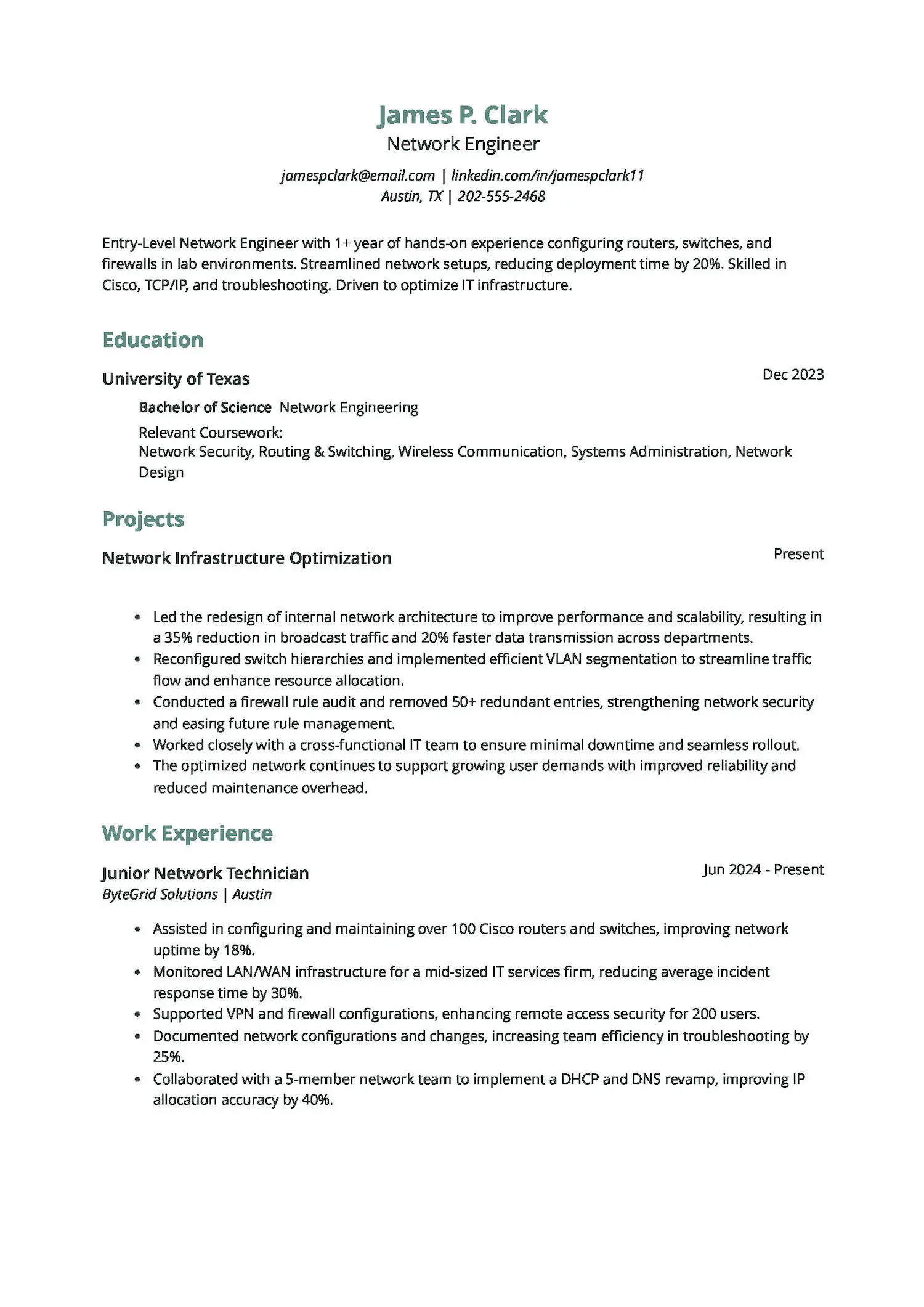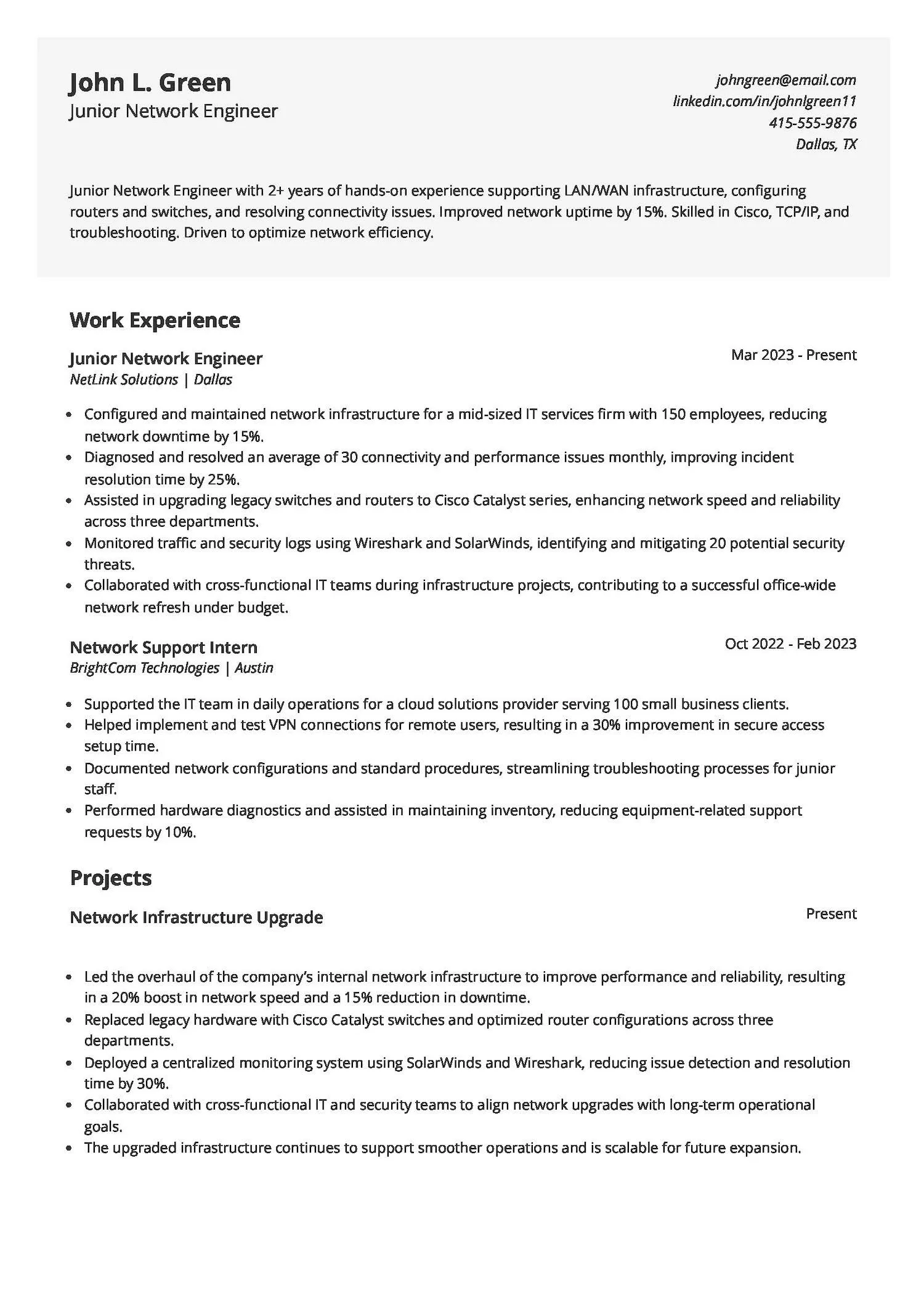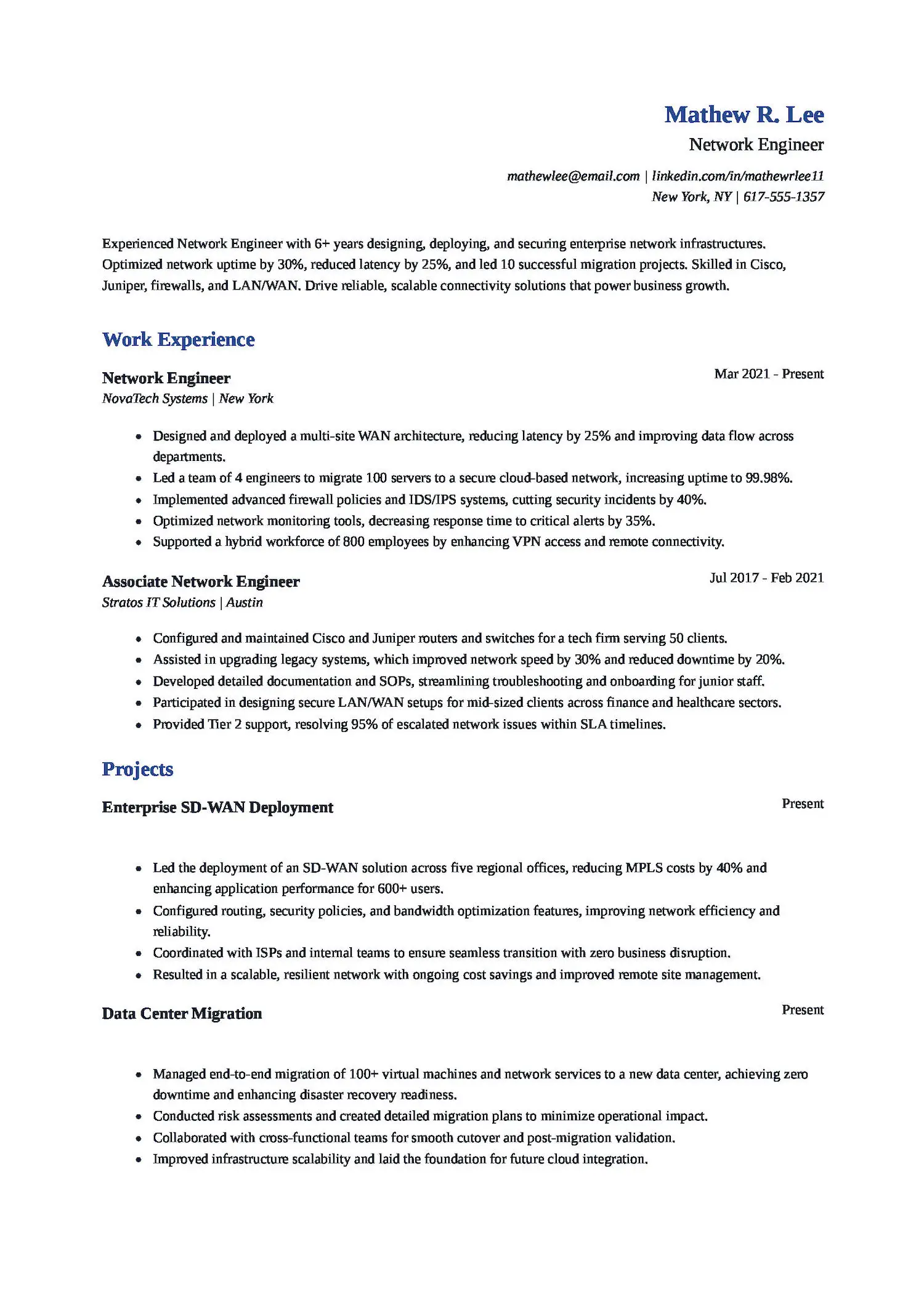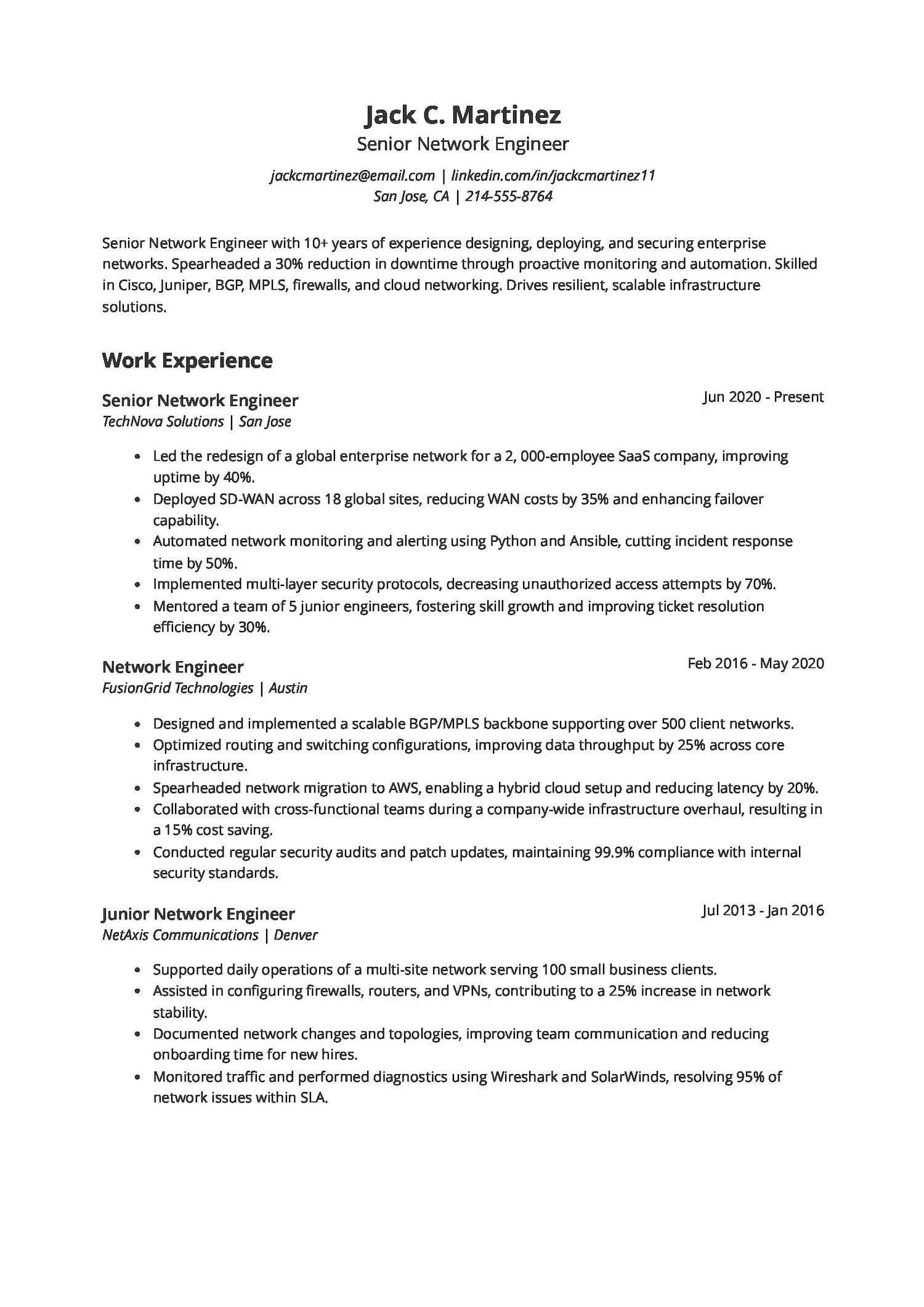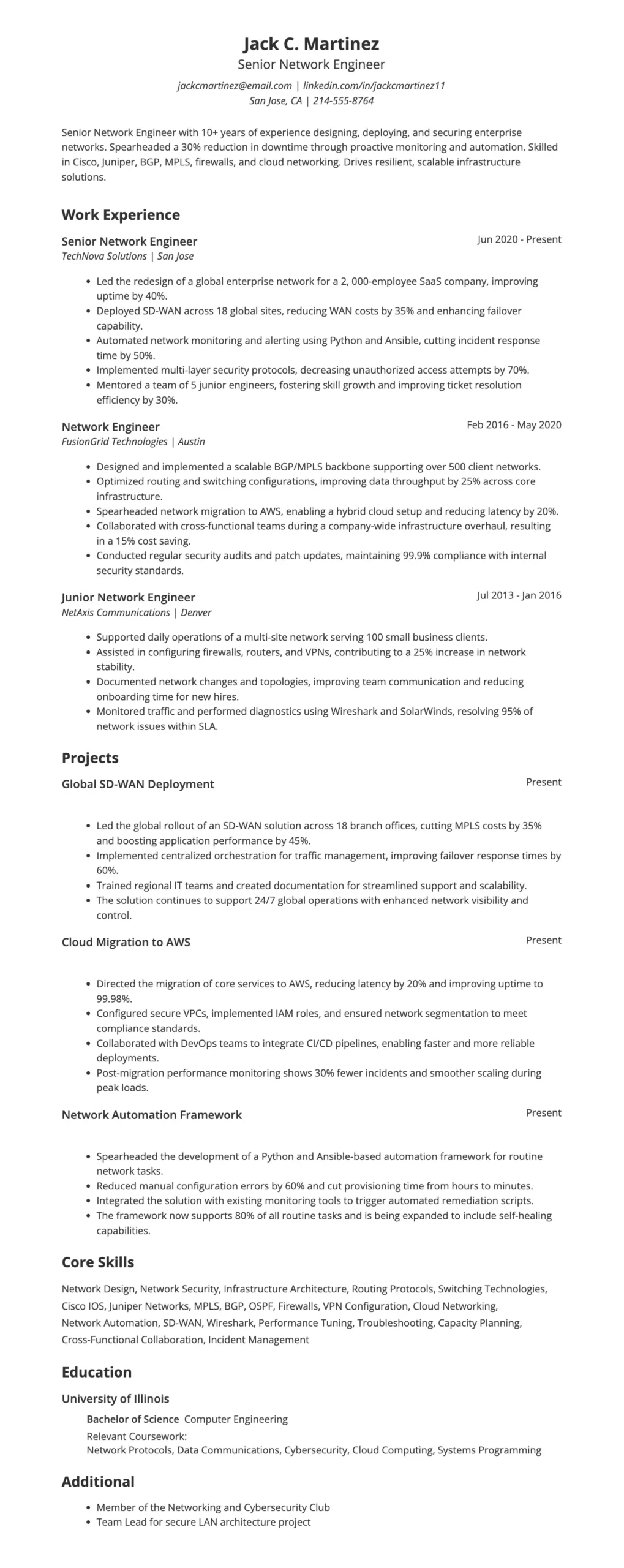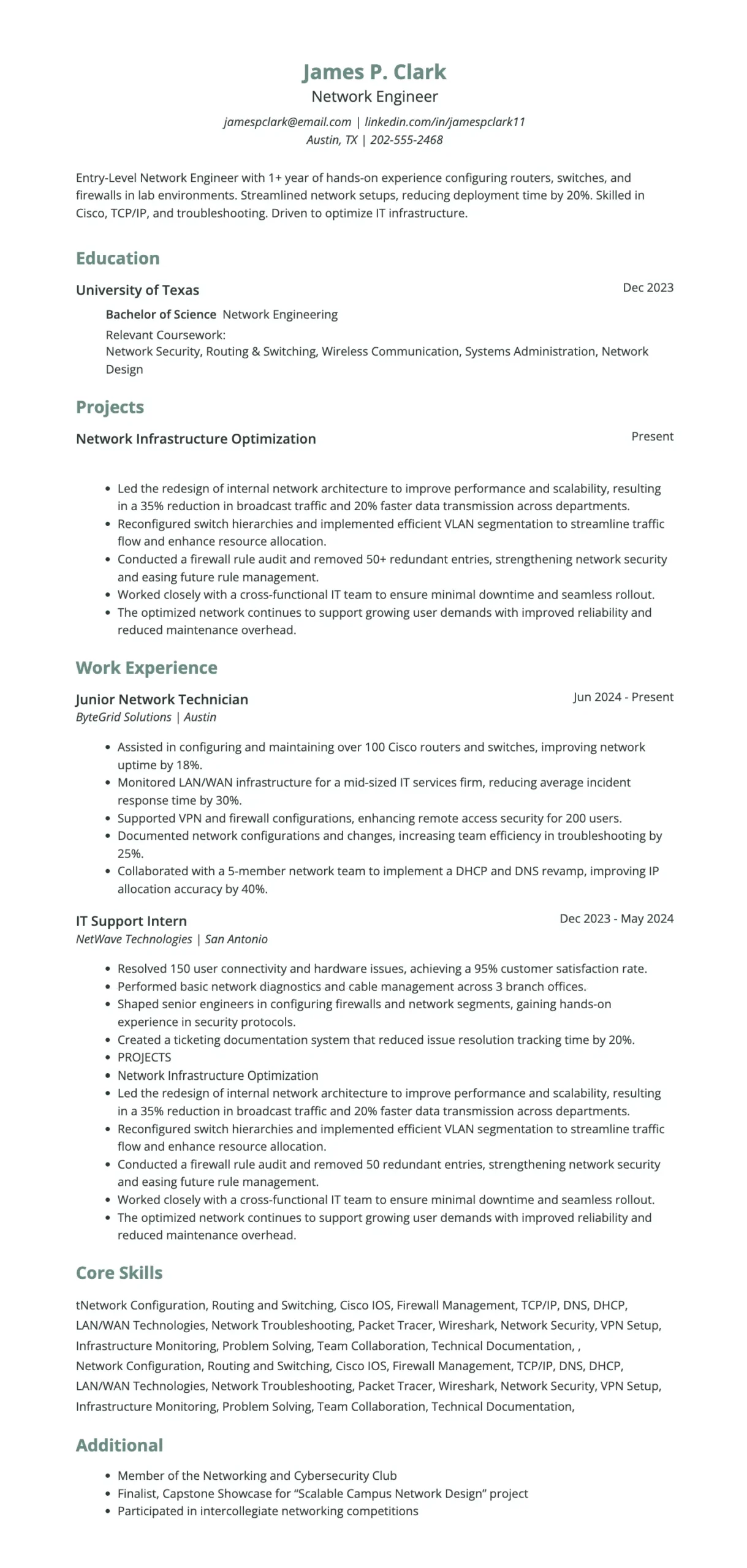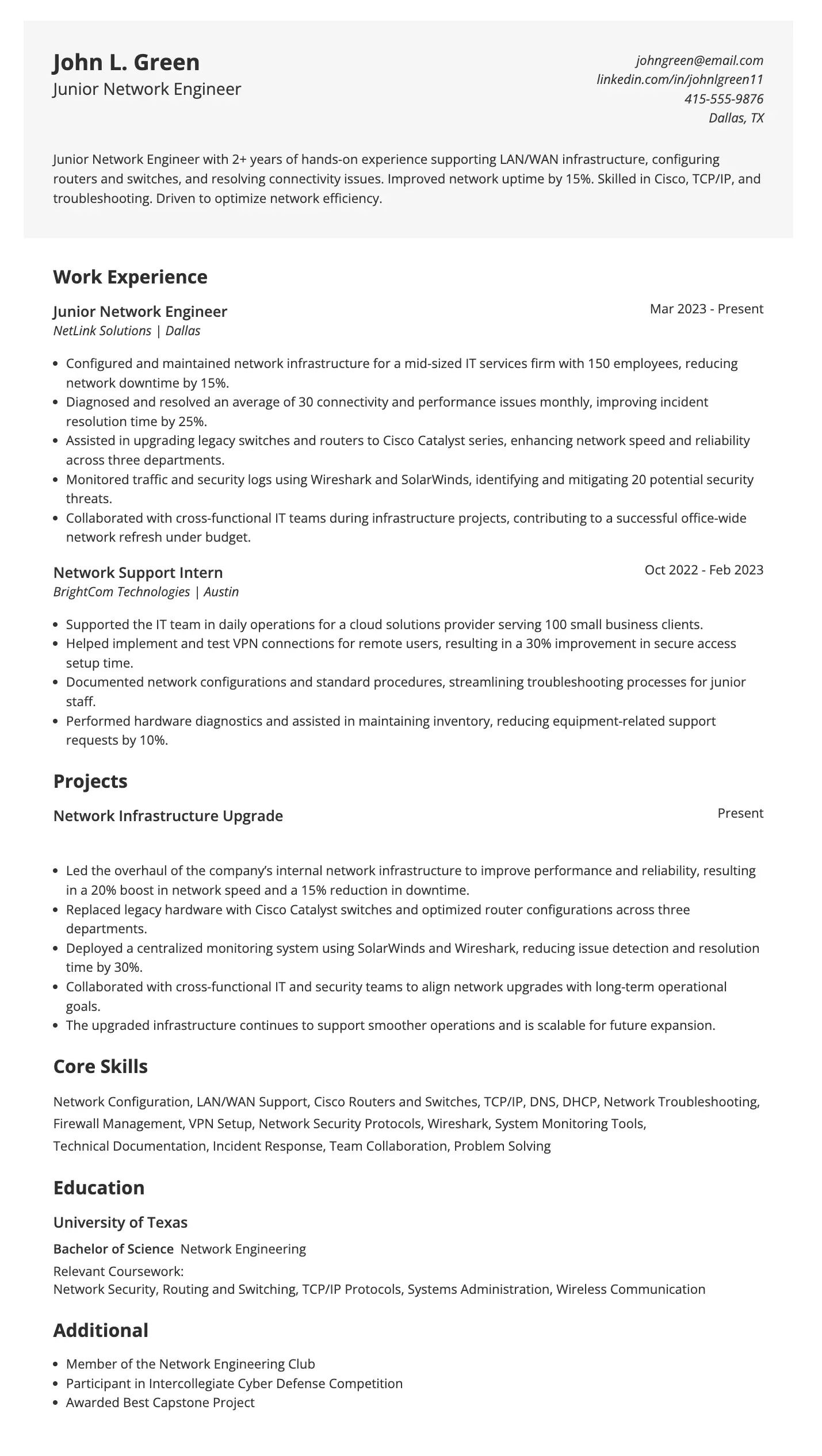Best Network Engineer Resume Examples & Tips 2025
Need a standout network engineer resume? In this blog, find the best network engineer resume examples, proven formats, essential skills, and expert tips to help you land the job.

November 18, 2024

Network engineers play a crucial role in building and maintaining the digital backbone of modern businesses. In this blog, you’ll find professionally designed resume examples, along with actionable tips to help your resume rise above the competition.
Employers seek candidates who not only have strong technical skills but can also communicate clearly and solve problems under pressure. A well-structured resume can be your gateway to landing interviews in this competitive field.
Ready to build a resume that actually gets noticed? Whether you’re just starting out or leveling up your career, keep reading—we’ve got examples, tips, and templates that speak the language of hiring managers and ATS systems.
Network engineer resume example
Standing out in today’s competitive job market, securing a network engineer position takes more than listing your skills. Showcasing real-world results, leadership, and technical depth is what gets attention. This network engineer resume example does exactly that—highlighting key achievements, in-demand tools, and impactful projects that hiring managers want to see.
Network engineering roles demand a strong grasp of designing, securing, and optimizing complex network systems. Employers look for candidates who can improve performance, support large teams, and adapt to evolving technologies. A resume that reflects this balance of expertise and results can make all the difference.
It highlights measurable wins—like reducing latency and boosting uptime—which show real impact. The project section stands out too, clearly outlining complex deployments with business results. Employers appreciate resumes that mix technical skills with results-driven storytelling, making it easy to see the value a candidate brings.
Senior network engineer resume example
Looking to land a senior network engineer role but not sure how to highlight your experience and technical skills the right way? Wondering how to show impact with your projects and stand out from other applicants? Check out the resume example below—it’s a strong reference for anyone aiming to step into or move up in senior-level network engineering positions.
Senior network engineering roles call for more than just technical know-how. Employers want professionals who can design resilient infrastructure, reduce downtime, and lead teams while staying current with cloud, security, and automation trends. It’s all about proven impact, leadership, and the ability to scale complex systems.
This resume template highlights leadership and technical impact—key for any senior role. The dedicated Projects section adds real value, with titles like Global SD-WAN Deployment and Cloud Migration to AWS showing scale and results. It’s clear, focused, and backed by numbers. The clean layout and ATS-friendly format make it easy for hiring managers to quickly spot skills, achievements, and relevance—exactly what they look for in senior hires.
Entry-level network engineer resume example
Trying to break into network engineering but not sure how to showcase your skills? Wondering how to make limited experience look impressive on a resume? This entry-level network engineer resume is a great example of how to highlight lab projects, internships, and technical abilities in a way that gets noticed.
Entry-level network engineer roles usually call for a solid understanding of routing, switching, and basic security concepts. Employers look for candidates who can troubleshoot, support infrastructure, and document network changes clearly. A strong resume should show both technical know-how and a proactive approach to learning and problem-solving.
It has a clear, focused summary that shows technical skills and real results—something hiring managers appreciate in entry-level roles. The internship adds value by showing hands-on support and collaboration in real environments. It also highlights tools like Cisco and Wireshark, which are often required. Overall, it’s clean, well-organized, and shows readiness to take on a junior network role.
Junior network engineer resume example
Building a strong foundation in network engineering means showing how your work directly impacts performance and uptime. Demonstrating real results, technical skills, and team contributions helps your resume stand out. This junior network engineer resume example highlights the right balance of accomplishments, tools, and project involvement to make a solid impression.
A junior network engineer role typically calls for candidates who can maintain network systems, resolve connectivity issues efficiently, and support ongoing upgrades. Employers value practical experience with Cisco equipment, network protocols, and monitoring tools, along with strong collaboration skills and a problem-solving mindset.
It lists core skills like Cisco, TCP/IP, VPN, and Wireshark—tools hiring managers look for right away. The education section backs it up with relevant coursework and projects, showing a solid understanding of network fundamentals. Even with limited experience, it highlights real impact like reducing downtime and improving resolution time. Clear structure, specific metrics, and job-ready skills make this resume stand out to employers.
Also Read: 10 Best Resume Skills to Put on a Resume
How to write a network engineer resume that will get you an interview
Writing a standout network engineer resume is about more than listing your technical skills. It’s about clearly showcasing your ability to design, implement, and maintain networks while aligning with what hiring managers are actually looking for. Whether you’re just starting out or have years of experience, the right resume can get your foot in the door and land you more interviews.
Many companies and IT departments use Applicant Tracking Systems (ATS) to sort through resumes long before a hiring manager ever sees them. Think of an ATS like a search engine—if your resume doesn’t include the right technical keywords, it could be filtered out before anyone even reads it.
For network engineering roles, hiring managers typically search for keywords like “Cisco,” “routing and switching,” “firewalls,” “VPN,” “LAN/WAN,” “network security,” “TCP/IP,” and “network troubleshooting.” Including these terms naturally and strategically throughout your resume can greatly improve your chances of making it past the ATS.
Here’s how ATS works:
- Job setup: Employers define specific roles, skills, and certifications (like CCNA or CompTIA Network+).
- Resume scanning: The system scans submitted resumes and identifies matches based on keywords and formatting.
- Filtering: Recruiters search the ATS database using job-relevant terms to surface qualified candidates.
Even if you’re a strong fit for the position, your resume might get overlooked if it’s not optimized. Using industry-specific terms and organizing your resume with clarity helps ensure it gets in front of the right people.
Need help creating an ATS-friendly resume? Tools like Jobscan’s Free Resume Builder can guide you in writing a structured, keyword-rich resume that highlights your network engineering expertise and improves your chances of landing interviews.
Optimize your resume for free
Use Jobscan's resume scanner to ensure your network engineer resume is ATS-friendly and includes all the necessary keywords from the job description.
Scan your resume
Key elements of a network engineer resume
Here are the must-have components every network engineer resume should include:
- Contact information – Include your name, phone number, email, and optionally, your LinkedIn profile or personal website.
- Professional summary – A brief overview of your background, certifications, and key skills tailored to the job you’re applying for.
- Certifications – Industry-recognized certifications like CCNA, CompTIA Network+, or CCNP can give you a competitive edge.
- Technical skills – List specific tools, platforms, and protocols you’ve worked with, such as Cisco routers, firewalls, TCP/IP, BGP, or VPNs.
- Work experience – Highlight accomplishments and responsibilities using metrics when possible in the work experience section (e.g., “Reduced network downtime by 30%”).
- Education – Include your degree(s) and relevant coursework if applicable.
- Projects or achievements – For entry-level applicants, showcase lab work or home network projects to demonstrate hands-on knowledge.
Write a strong professional summary
Your professional summary is your first impression. Think of it as your elevator pitch—a quick snapshot of what you bring to the table. Keep it concise (2–4 sentences) and tailor it to the job you’re applying for. Mention years of experience, key areas of expertise, and notable certifications. Avoid vague statements or generic objectives. Focus on what you can do for the company.
Below are some examples of both good and bad professional summaries.
Good examples of a resume summary
- “Detail-oriented network engineer with 5+ years of experience in configuring and maintaining enterprise networks. Proficient in Cisco networking, network security, and VoIP implementation. CCNP-certified and experienced in reducing downtime and improving network efficiency.”
- “Recent IT graduate with hands-on experience configuring routers and switches in lab environments. Skilled in subnetting, network troubleshooting, and supporting end-user connectivity. CompTIA Network+ certified and eager to contribute to a fast-paced tech team.”
Bad examples of a resume summary
- “I’m looking for a job where I can use my networking knowledge and grow in the field of IT.”
- “Hardworking and motivated professional with a passion for technology.”
Writing an impactful resume summary can feel challenging—but it’s a critical part of your network engineer resume. With Jobscan’s Resume Summary Generator, you can quickly create a concise, results-driven summary tailored to your experience and certifications. Just plug in a few details, and the tool will generate a professional summary designed to stand out to IT recruiters and network infrastructure hiring teams.
Demonstrate key network engineer skills
Hiring managers want to quickly see if you have the right mix of hard (technical) skills and soft (interpersonal) skills. Keep your skills section concise and easy to scan by listing specific abilities relevant to the job you’re targeting.
Hard skills for a network engineer
- Network Configuration
- Network Troubleshooting
- Network Management
- Cisco Routers
- Cisco Switches
- Firewalls
- VPN Setup
- TCP/IP
- DNS
- DHCP
- BGP
- OSPF
- EIGRP
- Network Security
- Linux
- Windows Server
- Wireshark
- SolarWinds
- Nagios
- Python
- Bash
- Ansible
- AWS
- Azure
Soft skills for a network engineer
- Analytical Thinking
- Communication
- Team Collaboration
- Time Management
- Adaptability
- Attention to Detail
- Problem Solving
- Documentation
Listing your skills is important, but the way you present them can set your resume apart. Instead of just naming responsibilities, use bullet points to show the results of your work—such as reducing network downtime, optimizing infrastructure, or improving security protocols. Below, we’ll break down good and bad examples to understand how to showcase your network engineering skills clearly and effectively.
4. Write impactful resume bullet points for network engineer
Good examples of resume bullet points
- “Configured and maintained Cisco routers and switches across a multi-site network, reducing latency by 25%.”
- “Implemented a new VPN solution for remote teams, improving secure access and cutting downtime by 40%.”
- “Monitored and resolved network issues using SolarWinds and Wireshark, achieving 99.9% uptime.”
- “Collaborated with cybersecurity team to deploy firewalls and enhance overall network security compliance.”
- “Automated routine network tasks with Python scripts, saving 10+ hours per week in manual configurations.”
Bad examples of resume bullet points
- “Worked on some network stuff and helped fix problems.”
- “Used tools to monitor the network and made improvements.”
- “Responsible for setting up equipment.”
- “Helped with VPNs and did other technical tasks.”
Highlight your achievements as a network engineer
Hiring managers want more than a list of responsibilities—they want to see results. To stand out, focus your work experience section on achievements, not just duties. Use bullet points that show the impact of your work using numbers, percentages, or specific outcomes whenever possible.
Here’s how you can highlight your achievements:
- “Deployed a multi-site VPN solution that improved secure remote access for 150+ users and reduced support tickets by 30%.”
- “Upgraded enterprise network infrastructure, resulting in a 40% increase in bandwidth and improved overall network reliability.”
- “Led a team of 3 engineers in redesigning the company’s core network, reducing latency by 22%.”
- “Resolved 95% of tier-2 network issues within SLA deadlines, contributing to a 98% customer satisfaction score.”
- “Configured VLANs and ACLs to segment sensitive data traffic, improving security posture and passing internal audits.”
Tailor your resume to the job description
One of the biggest mistakes job seekers make is sending the same resume to every job. To stand out, customize your resume to match the specific job title you’re applying for. Recruiters and applicant tracking systems (ATS) look for keywords and skills that match the job description—so make it easy for them to see you’re a fit.
Here’s how to tailor your resume effectively:
- Use keywords from the job post – Scan the job listing for key tools, certifications, and skills (like “Cisco IOS,” “BGP,” or “cloud networking”) and naturally incorporate them into your summary, skills, and professional experience sections.
- Highlight relevant experience first – Move the most relevant projects and achievements to the top of your work experience section if they match what the potential employer is seeking.
- Adjust your summary – Mention the exact title (e.g., “Network Security Engineer”) and emphasize the certifications or tools that align with the role.
- Mirror the language – If the job description says “network optimization,” use that phrasing instead of “network improvements.” This helps with both ATS and human readability.
- Trim unrelated content – You don’t need to list every task from past jobs—focus on the experiences that match this specific role.
Include relevant education and certifications
Your education and certifications show that you have both the foundational knowledge and specialized training needed to succeed as a network engineer. While experience carries a lot of weight, certifications often serve as key differentiators—especially if you’re early in your career or applying to roles that require specific technical knowledge.
Here’s how to showcase your education and certifications effectively:
- Clearly include your degree, major, and school (e.g., Bachelor of Science in Information Technology, ABC University).
- If you’re just starting out, list your graduation year and highlight relevant coursework such as Networking Fundamentals, Cybersecurity, or Routing and Switching.
- For seasoned network engineers, keep it brief—focus on your highest degrees and any specialized education.
- If you’re entering the networking field from another background, spotlight any certifications or coursework that show your shift into this space.
- Include industry-recognized certifications that reflect your expertise and credibility, such as CompTIA Network+, Cisco Certified Network Associate (CCNA), Cisco Certified Network Professional (CCNP), or Juniper Networks Certification.
- If you specialize in areas like network security or cloud networking, include relevant certifications like Certified Information Systems Security Professional (CISSP) or AWS Certified Advanced Networking.
- For highly experienced professionals, focus on top-tier certifications that signal advanced knowledge and leadership potential.
Top network engineer certifications
- Cisco Certified Network Associate (CCNA)
- Cisco Certified Network Professional (CCNP)
- CompTIA Network+
- CompTIA Security+
- Certified Information Systems Security Professional (CISSP)
- Juniper Networks Certified Associate (JNCIA)
- AWS Certified Advanced Networking – Specialty
- Microsoft Certified: Azure Network Engineer Associate
Network engineer resume tips
Before you hit submit, make sure your resume is polished and ready to impress. These quick tips can help your resume stand out from the stack—whether it’s being reviewed by a recruiter or scanned by an applicant tracking system (ATS).
- Customize every resume – Tailor your summary, skills, and work experience to match the job description.
- Use action verbs – Start bullet points with strong verbs like “Configured,” “Implemented,” “Optimized,” or “Led.”
- Quantify your impact – Whenever possible, back up your achievements with numbers or specific results.
- Keep it concise – Stick to one page if you’re entry-level, and no more than two pages for experienced candidates.
- Use a clean resume format – Avoid flashy designs. Use consistent spacing, readable fonts, and clear headings.
- Check for typos – Spelling or grammar mistakes can cost you the interview. Proofread or use a tool like Grammarly.
- Include only relevant experience – Focus on roles, projects, and skills that apply directly to network engineering.
- Keep certifications up to date – Make sure your listed certifications are current and align with the role you’re targeting.
Include a cover letter with your network engineer resume
A well-written cover letter can give you a significant edge over other network engineer candidates. It’s your opportunity to go beyond your resume and showcase your enthusiasm for building and maintaining secure, high-performance networks—while highlighting the specific experiences that make you a strong fit for the role.
While your resume focuses on your technical background, certifications, and experience, your cover letter helps personalize your application and connect your specific skills to the company’s needs.
What to include in your network engineer cover letter:
- A strong opening – Mention the exact position you’re applying for and express genuine interest in the company, team, or type of network infrastructure they manage.
- Relevant experience – Highlight certifications, tools, and past achievements that align closely with the job requirements (e.g., Cisco, firewalls, VPNs, BGP).
- Technical problem-solving – Emphasize your ability to troubleshoot complex issues, improve network performance, and contribute to secure, scalable systems.
- A compelling closing – Wrap up with a confident note about your fit for the role and express interest in the opportunity to interview.
You can also use tools like Jobscan’s Cover Letter Generator to help write a personalized, ATS-friendly cover letter that complements your resume and grabs the hiring manager’s attention.
Land your next network engineering job with a standout resume
In a competitive tech job market, a well-optimized resume can be the key to getting noticed by hiring managers and landing more interviews. Use our network engineer resume guide as inspiration to build a strong, ATS-friendly resume that highlights your technical skills, achievements, and certifications.
Ready to level up your career? Jobscan offers a suite of AI-powered tools to enhance your job search. Features like the Resume Scanner, One-Click Optimize, and LinkedIn Optimization help you align your resume with specific job descriptions by identifying missing keywords, formatting issues, and content gaps. With Jobscan, you can tailor your resume for each application and boost your chances of landing your next network engineering role.
Give our free resume builder a try!

Network engineer common interview questions
Can you explain the difference between TCP and UDP?
Answer:
“TCP is a connection-oriented protocol that ensures data is delivered in order and without errors, making it ideal for applications like web browsing or email. UDP is a connectionless protocol that sends data without verifying delivery, which makes it faster but less reliable—best for real-time applications like video streaming or online gaming.”
How do you troubleshoot a network that’s suddenly running slow?
Answer:
“I start by checking the basics—cabling, physical connections, and device status. Then I use tools like Wireshark or SolarWinds to analyze traffic and identify bottlenecks or abnormal usage. I also verify router and switch configurations, check for firmware issues, and review logs for signs of network hardware failure or external interference.”
What’s your experience with configuring firewalls and network security?
Answer:
“I’ve worked extensively with Cisco ASA and Palo Alto firewalls to define access control policies, block unauthorized traffic, and segment networks using VLANs. I also regularly monitor for intrusion attempts through intrusion detection systems and ensure compliance with company network security measures through regular audits and updates.”
How do you stay current with networking technologies?
Answer:
“I subscribe to networking forums and blogs like Network Computing and Packet Pushers, and I take certification courses through platforms like Cisco’s Learning Network. I also experiment with new tools and configurations in my home lab to stay hands-on with evolving technologies like SD-WAN and cloud-based networking.”
Network engineer resume frequently asked questions
What are the most important network engineer skills to highlight on a resume?
Focus on both technical and soft skills that match the job description. Key hard skills include network configuration, troubleshooting, firewalls, routing protocols (like BGP and OSPF), VPN setup, and experience with tools like Wireshark or Cisco equipment. Soft skills like problem solving, communication, and attention to detail are equally valuable, especially in team environments or high-pressure scenarios.
How do I include my education experience in a network engineer resume?
List your highest level of education first, especially if it’s in computer science, IT, or a related field. Include the degree name, school, and graduation year (if recent). If you’re early in your career, you can also mention relevant coursework, lab experience, or academic projects that align with the role. Keep it concise and place this section after your work history and skills.
How should I write a resume if I have no experience as a network engineer?
If you’re new to the field or do not have extensive experience, highlight transferable skills, relevant coursework, certifications (like CompTIA Network+ or CCNA), and any hands-on experience from labs, internships, or personal projects. Use a strong summary that shows your enthusiasm and willingness to learn, and frame any previous roles in terms of relevant skills like troubleshooting, technical support, or working with networked systems.
